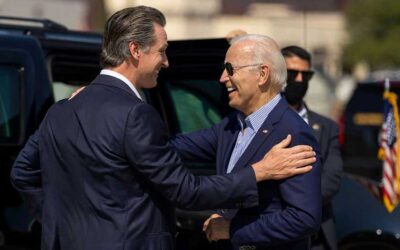In a speech this week, President Obama appealed to Congress to let the Bush tax cuts for the wealthy expire and to renew tax cuts for the middle class. Certainly, taxes should not be raised on the middle class. What’s interesting is his argument for doing so on the rich:
At the beginning of the last decade, Congress passed trillions of dollars in tax cuts that benefited the wealthiest Americans more than anybody else. And we were told that it would lead to more jobs and higher incomes for everybody, and that prosperity would start at the top but then trickle down.
And what happened? The wealthy got wealthier, but most Americans struggled. Instead of creating more jobs, we had the slowest job growth in half a century. Instead of widespread prosperity, the typical family saw its income fall. And in just a few years, we went from record surpluses under Bill Clinton to record deficits that we are now still struggling to pay off today.
So we don’t need more top-down economics. We’ve tried that theory. We’ve seen what happens. We can’t afford to go back to it. We need policies that grow and strengthen the middle class — policies that help create jobs, that make education and training more affordable, that encourage businesses to start up and create jobs right here in the United States.
So that’s why I believe it’s time to let the tax cuts for the wealthiest Americans — folks like myself — to expire. (Applause.) And, by the way, I might feel differently — because it’s not like I like to pay taxes — (laughter) — I might feel differently if we were still in surplus. But we’ve got this huge deficit, and everybody agrees that we need to do something about these deficits and these debts. So the money we’re spending on these tax cuts for the wealthy is a major driver of our deficit, a major contributor to our deficit, costing us a trillion dollars over the next decade.
The New York Times chimed in on his speech by saying
Citing well-documented facts, he pointed out that tax cuts at the top have failed to promote economic growth and have blown a hole in the federal budget.
Okay, think about this for a few moments. The cuts, as Obama notes, were enacted at “the beginning of the last decade”. What was happening with the economy then? Well, the dot-com bubble burst, and the Federal Reserve responded by doing more of the same that had created the bubble in the first place, keeping interest rates artificially low and thus creating the housing bubble. So what did the New York Times’ liberal columnist and Nobel-Prize winning economist Paul Krugman have to say about it then? In December 2002, he wrote (emphasis added):
Repeated interest rate cuts encouraged families to buy new houses and refinance their mortgages, putting cash in their pockets; yes, the tax cut also made a marginal contribution.
Krugman, of course, as I document in my book Ron Paul vs. Paul Krugman: Austrian vs. Keynesian economics in the financial crisis, strongly endorsed a policy of artificially low interest rates specifically in order to produce a housing bubble to replace the dot-com bubble. But notice what he admitted about the Bush tax cuts: they contributed to preventing the economy from being in worse shape than it otherwise would have been without them.
Keeping that in mind, look at Obama’s actual arguments. He says, look, we cut taxes on the rich and what happened? The economy just went to shit and the government went into record deficit spending. So we can see the results, we can see that when you cut taxes on the rich, it not only doesn’t help the economy, but has catastrophic consequences.
Notice that he didn’t consider even a single other factor. He doesn’t even characterize the cuts as merely contributing to the recession. No, it’s just, cuts were made, and the result was we got “this Great Recession”, as he put it. He didn’t explicitly say it, but his whole argument depends on this enormous logical leap, this fallacious assumption that the former was the cause of the latter.
And we are supposed to take this argument seriously? Well, the New York Times does. But that’s not saying much. Is the suggestion that the cuts are responsible for what he referred to as “this Great Recession” one of these “well-documented facts” the Times is talking about?
So it wasn’t the Fed’s monetary policy that caused our woes. Don’t look to our monetary system, in which a government-legislated private monopoly over the supply and money and credit creates money out of nothing at interest to the public, for an answer to the question of why the financial elites keep getting richer while everyone else is increasingly struggling to get by. Needless to say, the words “Federal Reserve” never appeared in Obama’s speech.
And don’t look to out-of-control government spending! No, nothing to see there!
No, the only cause he pointed to of what he himself termed in his speech “this Great Recession” was the Bush tax cuts. He argued that “the recover is still fragile” and so Congress should “extend the tax cuts for the 98 percent of Americans who make less than $250,000 for another year.”
But if letting middle class Americans keep more of their own money is good for the economy, why is the opposite true for the wealthiest Americans? What is the logic there?
Ah, we come to the question of the “record deficits”. The government is spending way more money than it collects in revenues. Now, there are two ways to reduce the deficit: raising taxes or cutting spending. Obama wants to do the former, but not the latter. In fact, he didn’t even bring up the question of spending cuts in his whole speech. The only place the word “spending” actually appeared was in the sentence “So the money we’re spending on these tax cuts for the wealthy is a major driver of our deficit…”
Think about that. Think about Obama’s choice of words there: equating letting Americans keep more of their own money with spending. So cutting taxes is now the same as a government expense. But the government’s actual spending is not even a topic for discussion. No, the deficit is not to be dealt with by cutting government spending, but by raising taxes on Americans.
And how about his claim to want to only raise taxes on the rich, but to not do so on the middle class? How true is his claim that he wants to free the middle class to run small business and create more jobs? Well, consider his Affordable Care Act, a.k.a. “Obamacare”. That raises taxes on the middle class. The penalty for not buying insurance under the individual mandate—which is unconstitutional, the Supreme Court’s Alice in Wonderland illogic to the contrary, which I deconstruct at length in this paper, notwithstanding—is “expected to raise about $4 billion per year by 2017.” Well, that may not be much in the big picture of trillion dollar deficits, but it’s still a tax affecting members of the middle class. And what will the ACA’s effect be on small businesses? As the Wall Street Journal has pointed out, “the National Federation of Independent Business (NFIB), on behalf of small business owners nationwide” had “joined the lawsuit with 20 states mounting a constitutional challenge to this devastating new health-care law.” The Journal explained:
This law is death by a thousand cuts for small business owners. According to the Congressional Budget Office (CBO), the overhaul will cost about $115 billion more than first projected, bringing the total to more than $1 trillion. Small businesses will also now have to deal with an onslaught of new taxes and burdensome paperwork.
Supporters say the law will significantly help small businesses, focusing on the much-talked about small business tax credit. But the reality is that the tax credit is complex and very limited because firms qualify based on number of employees and average wages. The credit, which is only available for a maximum of six years, puts small business owners through a series of complicated “tests” to determine if they qualify and how much they will receive. Fewer than one-third of small businesses even pass the first three (of four) tests to qualify: have 25 employees or less, provide health insurance, and pay 50% of the cost of that insurance.
More importantly, the credit is temporary, but health-care cost increases are permanent. When the credit ends, small businesses will be left paying full price. They’ll also be forced to deal with all sorts of new taxes, fees and mandates buried in this 2,000-page law.
One of these new taxes is a so-called health insurance fee. It’s a massive $8 billion tax (that escalates to $14.3 billion by 2018) on insurance companies based on their market share. This tax will be paid almost exclusively by small businesses and individuals because the law specifically excludes self-insured plans, the plans that most big businesses and labor unions offer, from having to pay the tax.
While the health insurance fee was designed to “go after” large health-insurance companies, the reality is that insurers aren’t simply going to absorb this new tax; it will be passed on to customers. Specifically, it will be passed on to the plans that 87% of small businesses and individuals buy. A study by the Federal Policy Group published last October found that the amount of taxes passed on to the typical family of four could be $500 or more per year.
Adding insult to injury, the law also requires all businesses to issue IRS 1099 forms to document every business-to-business transaction of $600 or more. To someone who’s never run a business, this may sound like nothing. But Congress hopes to raise $17 billion in added tax revenues and fees from this new mandate. That’s hardly nothing.
The burden of raising that expected revenue falls again on the backs of small business owners who already suffer under unmanageable federal paperwork burdens. What’s worse, this new reporting requirement has absolutely nothing to do with health-care reform. It was included to help pay for the nearly trillion-dollar price tag of the bill. Why should small business owners have to pay for a bill that causes them so much harm? They shouldn’t, which is why NFIB is fighting against this law in court….
The individual mandate imposes unique burdens on those small business people, including many NFIB members, who are sole proprietors and the least able to afford it. These independent men and women rarely can afford to distinguish between their own “personal” resources and those of their business. The mandate will now force them to spend money on insurance they may not want, rather than using those funds to run and grow their businesses.
So what was all that talk from Obama about wanting to help free middle class Americans and small business owners of the burden of the federal government?
The central problem with Obama’s thinking is that he thinks that government spending can create economic growth; that growth can come from the government using force to take money out of the pockets of Americans and having the government spend it instead. He thinks that bureaucrats in Washington know better how to spend individuals’ money than those individuals themselves; that the bureaucrats know better than the free market how best to direct scarce resources to the most productive ends. This is why he talks about solving the problem of the economy not by raising taxes and trying to find other ways to increase government revenue, rather than doing anything serious about trying to bring government spending under control.
The bottom line is that Obama offers nothing serious in the way of a plan for getting the country out of the recession. On the contrary, the train is heading for a cliff, and his solution is to throw more coal on the fire and try to make it go faster.



Awseome, just awesome